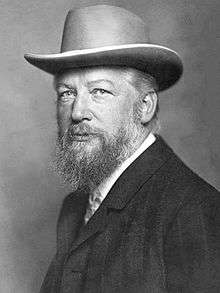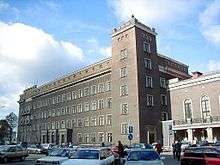Riga Technical University
|
Tehniskā universitāte | |
 | |
| Type | Public |
|---|---|
| Established | 1862 |
| Rector | Leonīds Ribickis |
| Students | 14, 997 (2016) |
| Location | Riga, Latvia |
| Campus | Urban |
| Affiliations | BSRUN, BALTECH, NORDTEK |
| Website | http://www.rtu.lv/ |
Riga Technical University (RTU) (Latvian: Rīgas Tehniskā universitāte) is the oldest technical university in the Baltics established on October 14, 1862. It is Located in Riga, Latvia it was previously known as Riga Polytechnical Institute and Riga Polytechnicum.
Riga Polytechnical Institute, 1862–1918
Riga Polytechnicum was first established in 1862 and was the first polytechnical institute in Imperial Russia. It offered degrees in agriculture, chemistry, engineering, mechanics, trade and architecture, with education in German. In 1896, it was renamed Riga Polytechnical Institute and the language of instruction was changed to Russian.
When World War I started in 1914, the Riga Polytechnical Institute was evacuated to Moscow and worked there until 1918. After that, part of the faculty returned to Latvia and joined the newly established University of Latvia. Others stayed in Russia and taught at universities there.
Riga Technical University, 1958–present
Riga Polytechnical Institute was re-established in 1958 by splitting off the engineering departments from the State University of Latvia. In 1990, it was renamed to Riga Technical University. The university currently consists of 9 faculties:[1]
- Faculty of Architecture and Urban planning
- Department of Architectural Design
- Department of History and Theory of Architecture
- Department of Fine Arts
- Faculty of Electronics and Telecommunications
- Department of Telecommunications Networks
- Department of Transmission Systems
- Department of Transport Electronics and Telematics
- Department of Radiosystems
- Department of Electronics Equipment
- Department of Fundamentals of Electronics
- Faculty of E-Learning Technologies and Humanities
- Department of Sport
- Department of Social Sciences
- Department of Engineering pedagogy and Psychology
- Department of Languages for Special Purposes
- Department of Technical Translation
- Faculty of Power and Electrical engineering
- Department of Electrical Engineering and Electronics
- Department of Industrial Electronics and Electrical Technologies
- Department of Power System Control and Automation
- Department of Electrical Machines and Apparatus
- Department of Electric Power Supply
- Department of Environment and Energy Systems
- Faculty of Computer Science and Information Technology
- Department of Modelling and Simulation
- Department of Management Information Technology
- Department of Image Processing and Computer Graphics
- Department of Computer Networks and Systems Technology
- Department of Computer Control Systems
- Department of Applied Computer Science
- Department of Software Engineering
- Department of Artificial Intelligence and Systems Engineering
- Department of Engineering Mathematics
- Department of Probability Theory and Mathematical Statistics
- Faculty of Building and Civil engineering
- Department of Roads and Bridges
- Department of Geomatics
- Department of Structural Analysis
- Department of Structural Engineering
- Department of Computer Aided Engineering Graphics
- Department of Heat and Gas Technology
- Department of Water Engineering and Technology
- Department of Civil Building Construction
- Department of Construction Technology
- Department of Composite Materials and Structure
- Department of Building Materials and Products
- Faculty of Engineering economics
- Department of Occupational Safety and Civil Defence
- Department of International Business, Transport Economics and Logistics
- Department of Customs and Taxes
- Department of Civil Engineering and Real Estate Economics and Management
- Department of the Territorial Development Management and Urban Economics
- Department of Quality Technology
- Department of Innovation and Business Management
- Department of Corporate Finance and Economics
- Faculty of Materials Science and Applied Chemistry
- Department of Silicate, High Temperature and Inorganic Nanomaterials Technology
- Department of Polymer Materials Technology
- Department of General Chemical Engineering
- Department of Materials Physics
- Department of Semiconductor Physics
- Department of Optics
- Department of Chemistry
- Department of Chemical Technology of Biologically Active Compounds
- Department of Design and Materials Technologies
- Department of Clothing and Textile Technologies
- Faculty of Transport and Mechanical engineering
- Department of Aeronautical Technologies
- Department of Avionics
- Department of Aircraft Theory and Design
- Department of Transport Systems and Logistics
- Department of Medical Physics and Engineering
- Department of Nanoengineering
- Department of Instrument Engineering
- Department of Material Processing Technology
- Department of Theoretical Mechanics and Strength of Materials
- Department of Mechanical Engineering and Industrial Design
- Department of Heat and Power Engineering Systems
- Department of Railway Transport
- Department of Automotive Engineering
- Department of Railway Automatics and Telematics
As of 2016, it had 14,997 students.
Riga Business School
The Riga Business School is a management–education institution within Riga Technical University. It was founded in 1991, in close cooperation with the State University of New York at Buffalo (USA) and the University of Ottawa (Canada), and it was the first higher education institution in the Baltic states that offered Master of Business Administration (MBA) programs in English.[2]
The school currently has more than 800 MBA graduates, mostly middle- and upper-level level managers both in Latvia and abroad. The education standards and structure are adopted from the North-American style MBA, which contains case studies, working in groups, and active participation in classrooms.
Rankings
Riga Technical University is ranked in the 800+ bracket in Times Higher Education World University Rankings 2016-2017.[3] In the 2018 edition of QS World University ranking, it placed in the 651-700 bracket. [4] RTU has been ranked 64th among EECA (Eastern Europe and Central Asia) universities, making it the second highest ranking university in Latvia (behind the University of Latvia) and the 7th in the Baltic states.[5] The Webometrics ranking also places RTU as Latvia's second best university after UoL.[6]
Notable faculty and alumni
Some of its most notable graduates are the Latvian-born Nobel Prize laureate Wilhelm Ostwald, the legendary Mayor of Riga George Armitstead, the former President of Latvia Andris Bērziņš, Prime Minister Valdis Dombrovskis and many others who have earned distinction in science and society.
| Wilhelm Ostwald | |
|---|---|
 Wilhelm Ostwald by Nicola Perscheid | |
| Born |
Friedrich Wilhelm Ostwald 2 September 1853 Riga, Governorate of Livonia, Russian Empire (now Latvia) |
| Died |
4 April 1932 (aged 78) Großbothen near Leipzig, Germany |
| Nationality | Baltic German by birth. Prussian, German (after 1871) |
| Scientific career | |
| Fields | Physical chemistry |
| Institutions |
University of Dorpat Riga_Technical_University University of Leipzig |
- Wilhelm Ostwald – Nobel Prize in Chemistry, faculty 1881–1887
- Alfred Rosenberg – German politician, Nazi Minister of Occupied Eastern Territories, executed for war crimes, alumnus
- Paul Walden – chemist, invented ethylammonium nitrate as the first example of an ionic liquid, alumnus
- Friedrich Zander – rocketry and spaceflight pioneer, alumnus
- Ignacy Mościcki – president of Poland (1922–1939), alumnus
- Bruno Abakanowicz – Polish mathematicial and electrical engineer, alumnus
- Władysław Anders – a general in the Polish army and a politician with the Polish government-in-exile
- Zbigņevs Stankevičs – Roman Catholic metropolitan archbishop of Riga (2010–), alumnus
- Moisei Ginzburg – Constructivist architect (1892–1946), alumnus
- George Armitstead (Latvian: Georgs Armitsteds, 1847 – 1912) was an engineer, entrepreneur and the fourth Mayor of Riga. One of the most influential Rigans of his time, Mayor of Riga (1901–1912), graduate of Riga Polytechnicum (1869, with distinction).
- Mikhail Dolivo-Dobrovolsky (186-1919) Engineer and inventor, creator of the three-phase alternating current power transmission system, RPI student (1878-1881).
- Zigfrīds Anna Meierovics – the first Minister of Foreign Affairs and the second Prime Minister of the Republic of Latvia, RPI graduate (1911)
- Hugo Celmiņš – Politician, social activist, agriculturist, twice held the office of Prime Minister of Latvia. RPI graduate (1903
- Andris Bērziņš – President of the Republic of Latvia, who won the presidential election held on 2 June 2011,RPI graduate (1971)
- Valdis Dombrovskis – Latvian politician who was Prime Minister of Latvia 2009 - 2014, RTU graduate (1995)
Gallery
References
- ↑ Structure and administration: RTU Structure
- ↑ Riga Business School. "History of RBS".
- ↑ "Riga Technical University Profile". Times Higher Education University Rankings. Retrieved 11 April 2017.
- ↑ "Riga Technical University Profile". QS World University Rankings. Retrieved 19 October 2017.
- ↑ "QS University Rankings: EECA 2016". 2016-06-08. Retrieved 2016-08-17.
- ↑ "Latvia | Ranking Web of Universities". www.webometrics.info. Retrieved 2016-08-17.
External links

- The English version of the web site of the RTU


